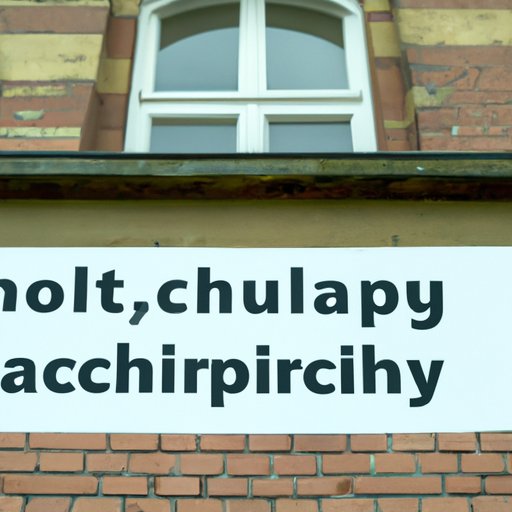Introduction
Mental health court is a specialized court system that focuses on providing treatment and support services to individuals with mental illness who have committed crimes. The purpose of this article is to explore the basics of mental health court, examine the benefits of the court for individuals with mental illness, understand the roles of mental health professionals in mental health court, analyze the challenges faced by the court, and investigate success stories from participants.
Exploring the Basics of Mental Health Court: What is it and How Does it Work?
A mental health court is a court system that deals specifically with cases involving individuals with mental illness. The goal of mental health court is to divert individuals from the criminal justice system and provide them with appropriate treatment and support services. Mental health courts are designed to reduce recidivism, improve outcomes for individuals with mental illness, and reduce overall costs associated with the criminal justice system.
There are two types of mental health courts: adult mental health courts and juvenile mental health courts. Adult mental health courts deal with cases involving individuals over the age of 18 who have been charged with a crime and have a diagnosed mental illness. Juvenile mental health courts are similar but deal with cases involving individuals under the age of 18.
The process of a mental health court typically begins when an individual is arrested and has been identified as having a mental illness. The individual is then referred to the mental health court and evaluated by a team of professionals. This team may include psychiatrists, psychologists, social workers, defense attorneys, prosecutors, and probation officers. The team will assess the individual’s mental health needs and develop a plan of care that includes treatment, support services, and other interventions. If the individual agrees to the plan of care, they will be placed in the mental health court program and monitored by the team.

Examining the Benefits of Mental Health Court for Individuals with Mental Illness
Mental health court offers many benefits to individuals with mental illness, including access to treatment, improved outcomes, and reduced recidivism.
Access to Treatment: Mental health court provides individuals with access to treatment that they may not otherwise receive. This includes access to medication, therapy, and other services that can help individuals manage their mental illness and lead healthier lives.
Improved Outcomes: Mental health court has been shown to improve outcomes for individuals with mental illness. Studies have found that individuals who participate in mental health court are more likely to adhere to their treatment plans, have fewer arrests, and have better overall outcomes than those who do not participate in the program.
Understanding the Role of Mental Health Professionals in Mental Health Court
Mental health professionals play an important role in the mental health court process. They provide assessments, treatment, and support services to individuals with mental illness and help to ensure that they are receiving the best possible care.
Role of Psychiatrists: Psychiatrists are medical doctors who specialize in diagnosing and treating mental illnesses. They evaluate individuals and provide medication, psychotherapy, and other treatments. In mental health court, psychiatrists are responsible for assessing individuals and providing recommendations for treatment and care.
Role of Psychologists: Psychologists are mental health professionals who specialize in understanding and treating mental illnesses. They provide assessment, diagnosis, and therapy to individuals with mental illness. In mental health court, psychologists are responsible for evaluating individuals and providing recommendations for treatment and care.
Role of Social Workers: Social workers are mental health professionals who specialize in helping individuals with mental illness access resources and services. In mental health court, social workers are responsible for connecting individuals to community resources and providing support services to help them manage their mental illness.

Analyzing the Challenges Faced by Mental Health Courts
Mental health courts face a number of challenges, including limited resources, lack of adequate funding, and complexity of cases.
Limited Resources: Mental health courts often lack the resources needed to adequately serve individuals with mental illness. This includes access to mental health professionals, treatment facilities, and other resources that are necessary for successful outcomes.
Lack of Adequate Funding: Mental health courts are often underfunded, which can lead to inadequate staffing and limited resources. This can limit the ability of the court to effectively serve individuals with mental illness.
Complexity of Cases: Mental health court cases can be complex. These cases often involve multiple agencies, multiple individuals, and multiple legal issues. This can make it difficult for mental health court teams to effectively serve individuals with mental illness.

Investigating Success Stories from Mental Health Court Participants
Mental health court has been successful in helping individuals with mental illness get access to treatment and stay out of the criminal justice system. Here are some examples of positive outcomes from mental health court participants.
Examples of Positive Outcomes: Mental health court has helped individuals with mental illness find employment, secure housing, and access treatment. One example is a participant who was able to find a job, secure housing, and stay on track with his treatment after participating in the court program.
Impact on Communities: Mental health court has had a positive impact on communities by reducing recidivism and improving outcomes for individuals with mental illness. This has resulted in safer communities and less strain on the criminal justice system.
Conclusion
Mental health court is an effective way to divert individuals with mental illness from the criminal justice system and provide them with access to treatment and support services. Mental health court offers many benefits to individuals with mental illness, including improved outcomes and reduced recidivism. Mental health professionals play an important role in the court process, providing assessments, treatment, and support services to individuals with mental illness. Despite its successes, mental health court faces challenges such as limited resources and lack of adequate funding. Success stories from participants demonstrate the positive outcomes that can result from participation in mental health court.
In summary, mental health court is an important resource for individuals with mental illness and a critical component of the criminal justice system. It is important to continue to invest in mental health court programs and ensure that they are adequately funded and resourced so that they can effectively serve individuals with mental illness.
(Note: Is this article not meeting your expectations? Do you have knowledge or insights to share? Unlock new opportunities and expand your reach by joining our authors team. Click Registration to join us and share your expertise with our readers.)
